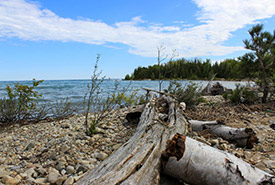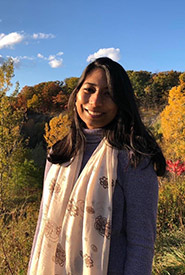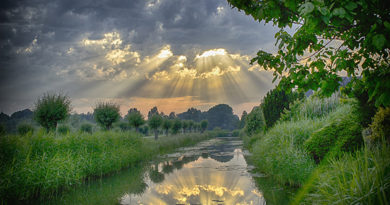NCC: Land Lines – Embracing Indigenous wisdom: My journey as a newcomer in Canada

Lake Huron, ON, one of the places where I go in nature for reflection (Photo by Rebecca Samuel/NCC staff)
Growing up in India, I always hoped to move abroad for higher studies, gain new experiences and better opportunities. I also had a passion to learn more about nature and wildlife. So, moving to Canada was a dream come true for me. I was going to miss my family and friends back home, but I was excited for what was ahead.
What I quickly learned after arriving here is that Canada is a land filled with diversity. There were people from different parts of the world, with many cultures, languages and histories. I was fortunate to be able to live, work and call this place my new home.
At the same time, I also gained a deeper understanding of Indigenous Peoples in Canada, the true caretakers of the Land. While this country is surrounded by the most beautiful landscapes, it also has a dark and painful history when it comes to its treatment of Indigenous Peoples. This history is characterized by colonization, displacement, systemic oppression and cultural assimilation. The impact of colonization has been profound and has had lasting effects on Indigenous communities.
During my time as a student at Fleming College, our entire class attended an Indigenous Professional Learning workshop at the Royal Ontario Museum in Toronto. We heard from Indigenous women and youth, as they shared their stories and Indigenous Knowledge. It was powerful to hear of their strength and resilience after facing traumas of the past.
Especially as a newcomer, I understood how crucial it was to acknowledge the injustices that were inflicted upon Indigenous communities and to work toward Reconciliation. This was not merely an academic exercise but a crucial step toward personal growth, learning and heartfelt reflection.
True Reconciliation requires tangible change. Words alone cannot bring about the systemic change needed to rectify the disparities and inequities faced by Indigenous Peoples. Concrete actions, such as policy changes, resource allocation and land rights recognition, are necessary to address the root causes of these issues.
While I still am a temporary resident in Canada, I believe I have a responsibility to do more than just acknowledge — I need to take steps to learn. So, whether you’ve lived in Canada all your life, or have just arrived, stand in solidarity with Indigenous Peoples.
Here are a few meaningful steps to take:
Visit local Indigenous cultural centres and museums: Many cities in Canada have Indigenous cultural centres and museums that offer exhibitions, workshops and educational programs. These are excellent places to start your learning journey.
Read books: Braiding Sweetgrass: Indigenous Wisdom, Scientific Knowledge, and the Teachings of Plants by Robin Wall Kimmerer. This book explores the intersection of Indigenous wisdom and scientific knowledge, particularly in the context of the natural world.
Seek out Indigenous-owned businesses: Support Indigenous entrepreneurs and businesses by shopping at Indigenous-owned stores and dining at Indigenous restaurants. This not only supports the community but also provides opportunities to learn about Indigenous cuisine and products.
Read the Truth and Reconciliation Commission Report: The Truth and Reconciliation Commission of Canada published a comprehensive report with 94 calls to action. Reading through it can provide valuable context and insights into the historical and contemporary issues facing Indigenous Peoples. Delivering on Truth and Reconciliation Commission Calls to Action (rcaanc-cirnac.gc.ca)
Learn the local Indigenous history: Research the specific Indigenous Peoples and histories of the region you’re living in. Each Indigenous Nation in Canada has its own unique culture and history.
Engage with Indigenous communities: Building relationships with Indigenous community members can be an enriching experience. Attend community events, workshops or meetings to connect and learn directly from Indigenous people.
This National Day for Truth and Reconciliation, as you take important actions, remember that learning about Indigenous Peoples in Canada is an ongoing process. Approach it with humility, respect and a willingness to listen and learn from Indigenous voices and perspectives.





